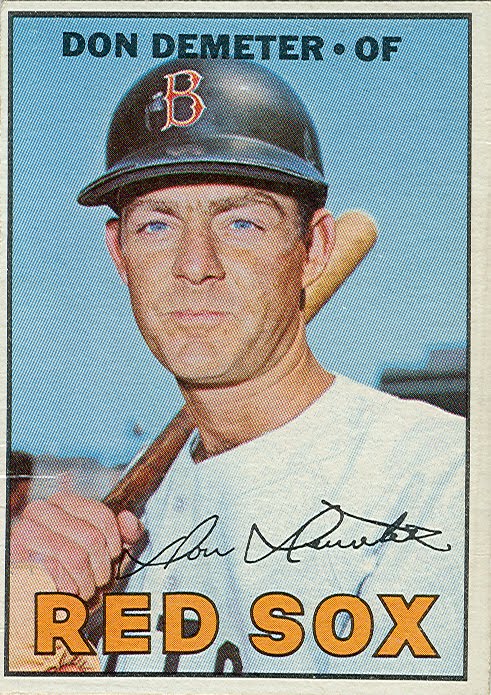
In the spring of 1967, racial issues were filling the headlines nearly every day. In Natchez, Mississippi, 800 Negroes (they were still called that then) marched on a factory to meet the Ku Klux Klan “face to face” but were dispersed after exchanging “stony stares” with white workers. A civil rights official named Wharlest Johnson, a plant employee, had been killed when his booby-trapped pickup exploded three blocks from the plant shortly after he left work.
Racial matters on the Red Sox were hardly that open, but issues were beginning to appear. An article by the late, great Ray Fitzgerald, a Globe columnist and reporter whose life was taken by cancer in his mid-50’s, authored a piece on Sox outfielder Don Demeter, who was in competition in spring training for the centerfield job.
Demeter had become famous-or infamous- by being the player the Sox received in a trade for pitcher Earl Wilson in June 1966. Wilson, the second African-American player brought up by the Sox (some said to be Pumpsie Green’s roommate) had been an erratic hurler over five seasons with the team. In 1962, he threw a no-hitter over the Angels that was filled with milestones. Not only was the first black American League hurler to toss a no-no, but the first pitcher to help his cause by hitting a home run. A great athlete and former catcher, Wilson received a large bonus from Tom Yawkey after the game. In the following years, however, his record had been up and down.
According to Howard Bryant’s book Shut Out: A Story of Race and Baseball in Boston, Wilson appeared to be coming into his own in the spring of 1966 when he was refused service at a Lakeland, Fla. bar. Two of his teammates were served, but he was told “we don’t serve n______s here.” Not surprisingly, Sox management did not back him and basically told them they wanted it forgotten. Wilson, a proud man from Louisiana to whom racism had been familiar all his life, eventually went to the press.
What happened was sad, but not surprising. On June 13, the Sox acquired two black players, Jose Tartabull and John Wyatt. Even though Dick O’Connell had taken over as GM, some racism-probably in the form of quotas-still remained. Four days later Wilson was traded, pretty much straight up, to Detroit for Demeter. O’Connell was said to have characterized Wilson as “a .500 pitcher”. Earl’s answer was “well, they weren’t a .500 team.” Over the next season and a half, Wilson would win 35 games for the Tigers,including a league high 22 in 1967. He would win 13 more in ’68 on a World Series winner.
Demeter, on the other hand, would hit .292 with 9 homers during the rest of 1966. After losing the centerfield job to Smith, he would be traded to Cleveland along with Tony Horton early in the 1967 campaign. It would be his final year in the majors.
Fitzgerald’s article described Demeter as “a proven major leaguer, a man who has hit 105 homers, a veteran who hustles all the time, and runs better than most men 6’4″ and 190 pounds.” But Dick Williams was going with youth, and Demeter was soon out of a job.
One wonders what the ’67 Sox would have been like with Wilson and Jim Lonborg heading up the rotation.
Add The Sports Daily to your Google News Feed!